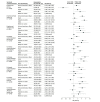Racial and Ethnic Disparities in Cancer Care During the COVID-19 Pandemic
- PMID: 35834248
- PMCID: PMC9284331
- DOI: 10.1001/jamanetworkopen.2022.22009
Racial and Ethnic Disparities in Cancer Care During the COVID-19 Pandemic
Abstract
Importance: The full effect of the COVID-19 pandemic on cancer care disparities, particularly by race and ethnicity, remains unknown.
Objectives: To assess whether the race and ethnicity of patients with cancer was associated with disparities in cancer treatment delays, adverse social and economic effects, and concerns during the COVID-19 pandemic and to evaluate trusted sources of COVID-19 information by race and ethnicity.
Design, setting, and participants: This national survey study of US adults with cancer compared treatment delays, adverse social and economic effects, concerns, and trusted sources of COVID-19 information by race and ethnicity from September 1, 2020, to January 12, 2021.
Exposures: The COVID-19 pandemic.
Main outcomes and measures: The primary outcome was delay in cancer treatment by race and ethnicity. Secondary outcomes were duration of delay, adverse social and economic effects, concerns, and trusted sources of COVID-19 information.
Results: Of 1639 invited respondents, 1240 participated (75.7% response rate) from 50 US states, the District of Columbia, and 5 US territories (744 female respondents [60.0%]; median age, 60 years [range, 24-92 years]; 266 African American or Black [hereafter referred to as Black] respondents [21.5%]; 186 Asian respondents [15.0%]; 232 Hispanic or Latinx [hereafter referred to as Latinx] respondents [18.7%]; 29 American Indian or Alaska Native, Native Hawaiian, or multiple races [hereafter referred to as other] respondents [2.3%]; and 527 White respondents [42.5%]). Compared with White respondents, Black respondents (odds ratio [OR], 6.13 [95% CI, 3.50-10.74]) and Latinx respondents (OR, 2.77 [95% CI, 1.49-5.14]) had greater odds of involuntary treatment delays, and Black respondents had greater odds of treatment delays greater than 4 weeks (OR, 3.13 [95% CI, 1.11-8.81]). Compared with White respondents, Black respondents (OR, 4.32 [95% CI, 2.65-7.04]) and Latinx respondents (OR, 6.13 [95% CI, 3.57-10.53]) had greater odds of food insecurity and concerns regarding food security (Black respondents: OR, 2.02 [95% CI, 1.34-3.04]; Latinx respondents: OR, 2.94 [95% CI, [1.86-4.66]), financial stability (Black respondents: OR, 3.56 [95% CI, 1.79-7.08]; Latinx respondents: OR, 4.29 [95% CI, 1.98-9.29]), and affordability of cancer treatment (Black respondents: OR, 4.27 [95% CI, 2.20-8.28]; Latinx respondents: OR, 2.81 [95% CI, 1.48-5.36]). Trusted sources of COVID-19 information varied significantly by race and ethnicity.
Conclusions and relevance: In this survey of US adults with cancer, the COVID-19 pandemic was associated with treatment delay disparities and adverse social and economic effects among Black and Latinx adults. Partnering with trusted sources may be an opportunity to overcome such disparities.
Conflict of interest statement
Figures



Similar articles
-
Racial and Ethnic Inequities in Cancer Care Continuity During the COVID-19 Pandemic Among Those With SARS-CoV-2.JAMA Netw Open. 2024 May 1;7(5):e2412050. doi: 10.1001/jamanetworkopen.2024.12050. JAMA Netw Open. 2024. PMID: 38767916 Free PMC article.
-
Racial and Ethnic Digital Divides in Posting COVID-19 Content on Social Media Among US Adults: Secondary Survey Analysis.J Med Internet Res. 2020 Jul 3;22(7):e20472. doi: 10.2196/20472. J Med Internet Res. 2020. PMID: 32568726 Free PMC article.
-
Associations of Race/Ethnicity and Food Insecurity With COVID-19 Infection Rates Across US Counties.JAMA Netw Open. 2021 Jun 1;4(6):e2112852. doi: 10.1001/jamanetworkopen.2021.12852. JAMA Netw Open. 2021. PMID: 34100936 Free PMC article.
-
Disparities in COVID-19 Monoclonal Antibody Delivery: a Retrospective Cohort Study.J Gen Intern Med. 2022 Aug;37(10):2505-2513. doi: 10.1007/s11606-022-07603-4. Epub 2022 Apr 25. J Gen Intern Med. 2022. PMID: 35469360 Free PMC article. Review.
-
Sex, Racial, and Ethnic Representation in COVID-19 Clinical Trials: A Systematic Review and Meta-analysis.JAMA Intern Med. 2023 Jan 1;183(1):50-60. doi: 10.1001/jamainternmed.2022.5600. JAMA Intern Med. 2023. PMID: 36469312 Free PMC article.
Cited by
-
Racial and Ethnic Inequities in Cancer Care Continuity During the COVID-19 Pandemic Among Those With SARS-CoV-2.JAMA Netw Open. 2024 May 1;7(5):e2412050. doi: 10.1001/jamanetworkopen.2024.12050. JAMA Netw Open. 2024. PMID: 38767916 Free PMC article.
-
Time to Treatment Initiation of Lung, Breast, Colorectal, and Prostate Cancers and Contributing Factors From 2015 to 2020 Utilizing Surveillance, Epidemiology, and End Results Program Database.World J Oncol. 2025 Apr;16(2):152-160. doi: 10.14740/wjon2519. Epub 2025 Feb 25. World J Oncol. 2025. PMID: 40162107 Free PMC article.
-
Documentation of individual-level social determinants of health among adults diagnosed with cancer in the United States.Sci Rep. 2025 Aug 13;15(1):29646. doi: 10.1038/s41598-025-13825-3. Sci Rep. 2025. PMID: 40804098 Free PMC article.
-
Urban and Rural Differences in Cancer Treatment Disruption Among Patients With COVID-19: An Analysis of the US ASCO COVID-19 in Oncology Registry.Cancer Med. 2025 Jan;14(2):e70512. doi: 10.1002/cam4.70512. Cancer Med. 2025. PMID: 39844369 Free PMC article.
-
Delays in Care by Race, Ethnicity, and Gender Before and During the COVID-19 Pandemic Using Cross-Sectional Data From the National Institutes of Health's All of Us Research Program.Womens Health Issues. 2024 Jul-Aug;34(4):391-400. doi: 10.1016/j.whi.2024.02.003. Epub 2024 Apr 9. Womens Health Issues. 2024. PMID: 38599938 Free PMC article.
References
Publication types
MeSH terms
Grants and funding
LinkOut - more resources
Full Text Sources
Medical

